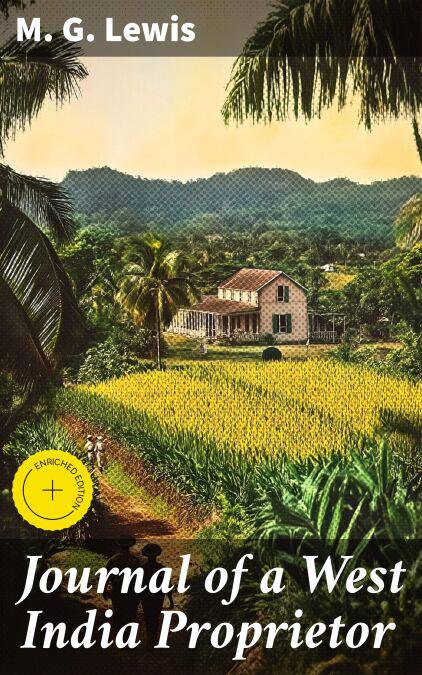
- Retrait gratuit dans votre magasin Club
- 7.000.000 titres dans notre catalogue
- Payer en toute sécurité
- Toujours un magasin près de chez vous
- Retrait gratuit dans votre magasin Club
- 7.000.0000 titres dans notre catalogue
- Payer en toute sécurité
- Toujours un magasin près de chez vous
Journal of a West India Proprietor EBOOK
Enriched edition. Kept During a Residence in the Island of Jamaica
M. G. Lewis
Ebook | Anglais
1,99 €
+ 1 points
Description
In "Journal of a West India Proprietor," M. G. Lewis offers a compelling and vivid chronicle of his experiences managing a sugar plantation in the Caribbean during the early 19th century. The text is rich in observational detail, blending elements of travel writing with the introspective reflections of a landowner deeply engaged in the socio-economic complexities of colonialism. Lewis's literary style is both engaging and critical; through his personal narratives and keen insights, he sheds light on the ethical dilemmas faced by plantation proprietors amidst the backdrop of emerging abolitionist sentiments in Britain. His work serves as an invaluable primary source that captures the tensions between economic ambition and moral consciousness of the era. Lewis himself was a contemporary of the Romantic period, having been born in 1775, and his experiences may have been shaped by the prevailing debates around colonialism and human rights. His intimate knowledge of the West Indies, combined with his engagement with British society, allowed him to portray a multi-faceted picture of plantation life, encompassing both the allure of wealth and the realities of exploitation. This duality reflects broader themes of the British colonial experience, making his account particularly significant in literary and historical studies. "Journal of a West India Proprietor" is essential reading for anyone interested in colonial literature, social history, or the ethical concerns surrounding plantation economies. It invites readers to grapple with the complexities of moral responsibility within an imperial framework, making it a thought-provoking contribution to both literary scholarship and discussions on colonial legacy.
In this enriched edition, we have carefully created added value for your reading experience:
- A succinct Introduction situates the work's timeless appeal and themes.
- The Synopsis outlines the central plot, highlighting key developments without spoiling critical twists.
- A detailed Historical Context immerses you in the era's events and influences that shaped the writing.
- An Author Biography reveals milestones in the author's life, illuminating the personal insights behind the text.
- A thorough Analysis dissects symbols, motifs, and character arcs to unearth underlying meanings.
- Reflection questions prompt you to engage personally with the work's messages, connecting them to modern life.
- Hand‐picked Memorable Quotes shine a spotlight on moments of literary brilliance.
- Interactive footnotes clarify unusual references, historical allusions, and archaic phrases for an effortless, more informed read.
In this enriched edition, we have carefully created added value for your reading experience:
- A succinct Introduction situates the work's timeless appeal and themes.
- The Synopsis outlines the central plot, highlighting key developments without spoiling critical twists.
- A detailed Historical Context immerses you in the era's events and influences that shaped the writing.
- An Author Biography reveals milestones in the author's life, illuminating the personal insights behind the text.
- A thorough Analysis dissects symbols, motifs, and character arcs to unearth underlying meanings.
- Reflection questions prompt you to engage personally with the work's messages, connecting them to modern life.
- Hand‐picked Memorable Quotes shine a spotlight on moments of literary brilliance.
- Interactive footnotes clarify unusual references, historical allusions, and archaic phrases for an effortless, more informed read.
Spécifications
Parties prenantes
- Auteur(s) :
- Editeur:
Contenu
- Nombre de pages :
- 535
- Langue:
- Anglais
Caractéristiques
- EAN:
- 4057664590084
- Date de parution :
- 28-11-19
- Format:
- Ebook
- Protection digitale:
- Digital watermarking
- Format numérique:
- ePub

Les avis
Nous publions uniquement les avis qui respectent les conditions requises. Consultez nos conditions pour les avis.






